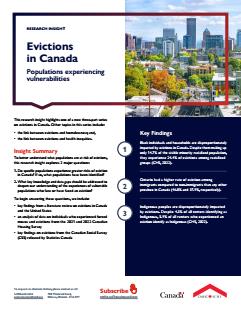This CMHC Research Insight explores which populations in Canada face greater risks of eviction. It also identifies where more data is needed to better understand the experiences of vulnerable groups.
The study combines findings from:
- a literature review on evictions in Canada and the United States
- analysis of 2021–2022 Canadian Housing Survey data, and
- results from the Canadian Social Survey
The evidence shows that certain populations — including Black individuals, Indigenous peoples and some immigrant groups — are disproportionately affected by evictions. These results highlight the need for targeted housing policies and further research.
Key Findings
- Black individuals and households are overrepresented among eviction cases. They make up 14.7% of the visible minority population but 24.4% of evictions among racialized groups.
- In Ontario, eviction rates for immigrants are higher than for non-immigrants (46.0% vs. 37.9%).
- Indigenous peoples are disproportionately affected. They represent 4.3% of all renters but 5.9% of renters who have experienced eviction.
About this series
This research insight is the third in a 3-part series on evictions in Canada. The other reports in the series explore:
- Evictions in Canada: Links between evictions and homelessness
- Evictions in Canada: Inequities in health among groups at higher risk of evictions
- Author:
- CMHC
- Document Type:
- Date Published:
- September 9, 2025







 Share via Email
Share via Email
